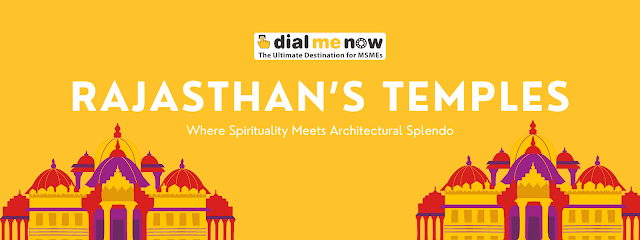Introduction:
Rajasthan, a land steeped in history and culture, is not only known for its magnificent forts and palaces but also for its spiritual sanctuaries—temples that stand as testaments to both devotion and architectural brilliance. In this blog post, we embark on a soulful journey through Rajasthan's temples, exploring the spiritual richness and architectural splendor that define these sacred spaces.
Eklingji Temple: A Divine Abode in Udaipur
Architectural Splendor: Nestled in the city of lakes,
Udaipur, the Eklingji Temple is a marvel of architecture dedicated to Lord
Shiva. The intricate carvings, mesmerizing archways, and towering spires
showcase the Māru-Gurjara architectural style. The temple complex, with its 108
temples, exudes a sense of divine tranquility.
Spiritual Significance: Eklingji Temple is not just
an architectural gem; it holds immense spiritual importance for devotees. The
four-faced idol of Lord Shiva, made of black marble, is the presiding deity.
The temple comes alive during the Maha Shivaratri festival, attracting pilgrims
and tourists alike.
Brahma Temple, Pushkar: A Rare Devotion
Architectural Splendor: The Brahma Temple in Pushkar
is one of the very few temples dedicated to Lord Brahma in the world. The red
spire and marble flooring complement the serene surroundings of Pushkar Lake.
The temple's design is a blend of Rajasthani and Mughal architectural styles,
creating a unique visual appeal.
Spiritual Significance: Devotees flock to the Brahma
Temple, especially during the Kartik Purnima festival, to take a holy dip in
Pushkar Lake and seek blessings. The temple is a symbol of rare devotion, and
its tranquil ambiance makes it an oasis of spirituality in the heart of
Pushkar.
Karni Mata Temple, Deshnok: The Rat Temple
Architectural Splendor: While the Karni Mata Temple's
architecture is relatively simple, its uniqueness lies in its
inhabitants—thousands of rats that roam freely. The temple's gates, marble
carvings, and silver doors contrast with the unusual yet intriguing presence of
these revered rodents.
Spiritual Significance: Dedicated to Karni Mata,
considered an incarnation of Goddess Durga, the temple is a pilgrimage site
where devotees seek the blessings of the rat goddess. It's believed that
spotting a white rat in the temple is considered extremely auspicious.
Khatushyamji Temple: A Symbol of Devotion
Architectural Splendor: Located in the Sikar
district, the Khatushyamji Temple is an architectural masterpiece with its
intricately carved columns and vibrant frescoes. The temple's unique red facade
and ornate detailing make it a captivating sight.
Spiritual Significance: Devotees from far and wide
visit Khatushyamji Temple to seek the blessings of Shyam Baba, a manifestation
of Lord Krishna. The temple's annual fair, held in the month of Phalgun
(February–March), witnesses a grand celebration attended by thousands.
Dilwara Jain Temples, Mount Abu: A Jewel in the Hills
Architectural Splendor: Situated amidst the lush
hills of Mount Abu, the Dilwara Jain Temples are renowned for their
unparalleled marble architecture. The intricate carvings, detailed ceilings,
and exquisite marble work make these temples a shining example of Rajasthan's
artistic prowess.
Spiritual Significance: Dilwara Jain Temples hold
immense significance for the Jain community. Dedicated to different Jain
Tirthankaras, each temple within the complex has its unique charm. The Vimal
Vasahi Temple and Luna Vasahi Temple are particularly revered for their architectural
grandeur.
Conclusion: A Spiritual Odyssey
As we conclude our journey through Rajasthan's temples, it
becomes apparent that these sacred spaces are not just physical structures;
they are repositories of history, devotion, and artistic brilliance. Each
temple tells a story—of faith, culture, and the enduring spirit of Rajasthan.
Whether it's the grandeur of Eklingji Temple, the rare
devotion of Brahma Temple in Pushkar, the unique rat inhabitants of Karni Mata
Temple, the ornate beauty of Khatushyamji Temple, or the marble marvels of
Dilwara Jain Temples, Rajasthan's temples offer a spiritual odyssey that
transcends time and resonates with the soul.
Visiting these temples is not just a religious experience;
it's an immersion into the rich tapestry of Rajasthan's cultural and
architectural heritage. The spiritual echoes that reverberate within these
sacred walls serve as a testament to the timeless allure of Rajasthan's
temples.



.png)
.png)
.png)
.png)



